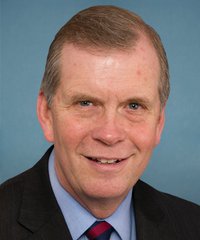
Tim Walberg is currently serving his seventh term in Congress as the representative of south-central Michigan. The diverse constituency of Michigan’s 7th District encompasses Branch, Eaton, Hillsdale, Jackson, Lenawee, and Monroe Counties, along with parts of Washtenaw County. Since first taking office, Tim has hosted hundreds of coffee and town hall meetings to better understand the thoughts and concerns of the district.
Prior to his time in public office, Tim served as a pastor in Michigan and Indiana, as president of the Warren Reuther Center for Education and Community Impact, and as a division manager for Moody Bible Institute. He also served in the Michigan House of Representatives from 1983 to 1999, and is proud to bring his reputation as a principled legislator, fiscal reformer, and defender of traditional values to Washington.
In my capacity as the Chairman of the Subcommittee on Health, Employment, Labor and Pensions (HELP), I am working with my colleagues to promote policies that grow our economy, allow businesses to create new jobs, strengthen employee benefit program, and safeguard the rights of workers and employers. The HELP subcommittee is tasked with overseeing matters dealing with relationships between employers and employees, expanding business opportunities, employee benefits, and retirement security for American workers.
The subcommittee has jurisdiction over a number of labor laws, including:
National Labor Relations Act – Enacted in 1935, the NRLA recognizes the right of employees to engage in collective bargaining through representatives of their own choosing. The National Labor Relations Board (NRLB) is the federal agency charged with implementing the NRLA. The NLRB investigates and adjudicates representation disputes, complaints of unfair labor practices, and contract disputes.
Labor Management Relations Act (“Taft-Hartley”) – Seeks to prevent labor-management disputes that would burden or obstruct commerce and harm the economy, by listing unacceptable labor practices for unions, guarantees certain freedoms of conduct and speech to employers, and provides for states to enact right-to-work laws.
Labor-Management Reporting and Disclosure Act (“Landrum-Griffin Act”) – Establishes a union member “Bills of Rights,” safeguards against improper disciplinary actions, freedom of speech, freedom from interference with the right to sue, and freedom from increased dues except by majority vote. Also requires unions to issue yearly financial disclosures, and set forth specific election procedures.
Employee Retirement Income Security Act (ERISA) – Sets minimum standards that private-sector pension and health plans must met with respect to reporting and disclosure, employee participation and vesting, plan funding, and fiduciary standards.